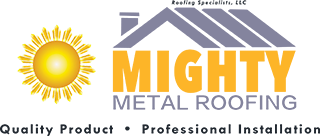FAQ'S

Any Questions
Frequently Asked Questions
This is one of the biggest misconceptions about residential metal roofing. People who’ve experienced barns or other structures where the metal roofing is visible from the interior can recall the “pinging” noise that rain makes when it hits the barn’s metal roof. In barn metal roofing applications, the metal roof is installed without a solid roof deck, so there is no dampening effect when something contacts the barn’s metal roof. In residential applications, metal roofing is installed on a solid plywood deck, just like roofing shingles. When installed in this manner, metal roofing is no noisier than other roof materials.
Mighty Metal Roofing’s premium metal roofing products utilize high strength Metal Construction Association (MCA) certified steel that’s protected by an aluminum, zinc, and silicon anti-corrosion coating, commercially known as Galvalume®. The corrosion resistance of our steel roof is so outstanding, even our unpainted metal roof panels carry a 30 year limited warranty. We use this same high performance steel with our 40 Year and Lifetime series paint systems, giving you the highest level of corrosion resistance available.
A metal roof has no greater chance of being hit by lightning than any other type of roof. Lightning typically targets the highest point in a given area, regardless of material. In the event that your roof is struck by lightning, a metal roof can actually help prevent damage by dissipating the electrical charge. Also, a metal roof is non-combustible.
Since metal is a premium upgrade, you can expect metal roofs to cost more up-front than a quality asphalt shingle roof. However, over the life of the roof, a metal roof can save you over 60% in total installation and maintenance costs. Mighty Metal Roofing provides a complimentary home inspection with a project estimate. Our expert technicians will come to your home, measure your roof and provide you with an exact cost to upgrade.
Because metal roofing is so lightweight relative to its strength, metal roofs can usually be installed over existing roof materials. It’s very common for metal roofs to be installed directly on top of asphalt shingled roofs. This saves on labor and disposal costs for stripping the old roof, not to mention reducing landfill waste. Local building codes and the condition of your current roof’s substructure will ultimately determine if you can install your metal roof in this manner.
The metal roofing gauge is a measurement of the thickness of the metal, but it’s important to remember that the metal increases in thickness as the gauge numbers decrease. Mighty Metal Roofing offers several gauge options for metal roofing.



